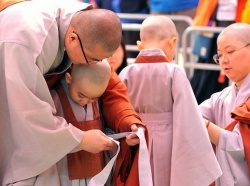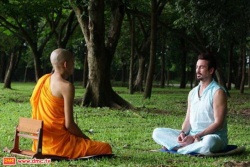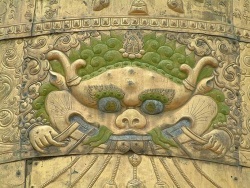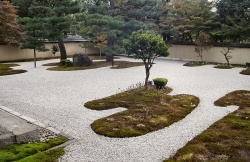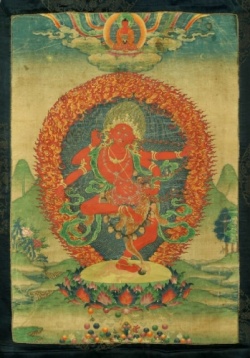Difference between revisions of "The Nature Of Hells"
| Line 1: | Line 1: | ||
| − | {{DisplayImages|2134|325|823|3629|1964 | + | {{DisplayImages|2134|325|823|3629|1964}} |
<poem> | <poem> | ||
[[Niraya]] | [[Niraya]] | ||
| − | In the [[world]] every country has prisons or jails to confine offenders and criminals. In the same way there [[exist]] various types of [[hells]] for those who have committed [[unwholesome]] [[deeds]]. These [[hells]] are | + | In the [[world]] every country has prisons or jails to confine offenders and criminals. In the same way there [[exist]] various types of [[hells]] for those who have committed [[unwholesome]] [[deeds]]. These [[hells]] are [[utuja rupa]] [[caused]] by utu and based on one's [[evil]] [[kamma]]. [[Hells]] differ in [[nature]] depending on the [[degree]] and severity of the [[evil]] [[deeds]] committed. The Lohakumbhi [[hell]] (the [[hell]] of [[hot]] molten metal) is situated below the [[earth's]] crust in close proximity to the [[human]] abode. |
| − | According to the texts, there are [[eight great hells]] or the planes of [[misery]] - [[Sanjiva]], [[Kalasutta]], [[Sanghata]], [[Roruva]], [[Maharoruva]], [[Tapana]], [[Maha]] [[Tapana]] and [[Avici]]. In each great [[hell]] there are five minor [[hells]] - excrete [[hell]], [[hot]] sties [[hell]], [[hell]] of Boombax [[trees]], [[hell]] of sword-like leaves and [[hell]] of molten {{Wiki|iron}}. These five minors [[hells]] surrounding each great [[hell]] are collectively called [[Ussada Niraya]] ( | + | According to the texts, there are [[eight great hells]] or the planes of [[misery]] - [[Sanjiva]], [[Kalasutta]], [[Sanghata]], [[Roruva]], [[Maharoruva]], [[Tapana]], [[Maha]] [[Tapana]] and [[Avici]]. In each great [[hell]] there are five minor [[hells]] - excrete [[hell]], [[hot]] sties [[hell]], [[hell]] of Boombax [[trees]], [[hell]] of sword-like leaves and [[hell]] of molten {{Wiki|iron}}. These five minors [[hells]] surrounding each great [[hell]] are collectively called [[Ussada Niraya]] ([[small hells]]). |
[[Yama]], the [[King of Hell]] | [[Yama]], the [[King of Hell]] | ||
| − | [[Yama]], the [[king of hell]] belongs to the abode of Catumaharaja and is known as the | + | [[Yama]], the [[king of hell]] belongs to the abode of [[Catumaharaja]] and is known as the [[Vemanika Peta]]. He sometimes enjoys [[pleasure]] of [[Deva]] and sometimes [[suffers]] the woes of a [[peta]] ([[hungry ghost]]) because of his {{Wiki|past}} [[deeds]]. There are many [[Yamas]] who preside over the trial of sinners in their offices situated at the four gates of [[hell]]. Their duties are like the judges of the [[human world]]. Not all those who arrive at the gates are [[subject]] to trail. |
| − | Those who had done grave [[unwholesome]] [[kamma]] [[deeds]], which are quite evident, are at once sentenced to deserving [[hells]] directly. Those with minor [[akusala kamma]] are granted the right to appeal for pardon to the [[Yamas]]. The trails conducted are not meant to incriminate but to condone minor [[evil]] [[deeds]]. They officiate as appellate. [[Yama]], the [[king of hell]] is just and impartial {{Wiki|monarch}}, as mentioned in the [[Deva | + | Those who had done grave [[unwholesome]] [[kamma]] [[deeds]], which are quite evident, are at once sentenced to deserving [[hells]] directly. Those with minor [[akusala kamma]] are granted the right to appeal for pardon to the [[Yamas]]. The trails conducted are not meant to incriminate but to condone minor [[evil]] [[deeds]]. They officiate as appellate. [[Yama]], the [[king of hell]] is just and impartial {{Wiki|monarch}}, as mentioned in the [[Deva Duta Sutta]], Uparipannasa [[Pali]]. |
The Wardens of [[Hell]] | The Wardens of [[Hell]] | ||
| − | These [[hell]] wardens also belong to the class of | + | These [[hell]] wardens also belong to the class of [[Catumaharaja Deva]]. They are either ogres or {{Wiki|demons}}. Their regular duties include sending minor sinners to [[Yama]] for trail and carrying out {{Wiki|cruel}} punishments to serious sinners. Since hellfire is a [[form]] of [[utuja rupa]] [[caused]] by [[evil]] [[deeds]], only the sinners and not the [[hell]] wardens are scorched by the heat. |
A Trail Chaired by [[Yama]] | A Trail Chaired by [[Yama]] | ||
| − | The following is a brief account of a trail conducted by [[Yama]]; this episode is taken from [[Deva | + | The following is a brief account of a trail conducted by [[Yama]]; this episode is taken from [[Deva Duta Sutta]]. Whenever a sinner is brought before [[Yama]], he always asks them about the five [[divine]] messengers ([[Panca Deva Duta]]) - an {{Wiki|infant}}, an aged, an inform, a [[dead person]] and a prisoner. |
[[Yama]]: Sinner, while you are a [[human being]] did you not see new born baby wallowing helplessly in his or her own excreta? | [[Yama]]: Sinner, while you are a [[human being]] did you not see new born baby wallowing helplessly in his or her own excreta? | ||
| Line 47: | Line 47: | ||
d. [[Roruva]] [[Hell]] | d. [[Roruva]] [[Hell]] | ||
| − | [[Roruva]] is the [[hell of wailing]] sinners. Hell-fires burn furiously and enter the sinners' [[bodies]] from the nine openings. The sinners [[suffer]] from intense agony and wail loudly. This is also known as | + | [[Roruva]] is the [[hell of wailing]] sinners. Hell-fires burn furiously and enter the sinners' [[bodies]] from the nine openings. The sinners [[suffer]] from intense agony and wail loudly. This is also known as [[jala roruva]]. |
e. [[Maha]] [[Roruva]] [[Hell]] | e. [[Maha]] [[Roruva]] [[Hell]] | ||
| − | This [[hell]] is completely engulfed in very thick smoke. Sinners [[suffer]] the agony as described in [[Roruva]], except that hell-fire is replaced with hell-smoke. This [[hell]] is known as [[Dhuma | + | This [[hell]] is completely engulfed in very thick smoke. Sinners [[suffer]] the agony as described in [[Roruva]], except that hell-fire is replaced with hell-smoke. This [[hell]] is known as [[Dhuma Roruva Niraya]], the [[hell]] of smoke. |
f. [[Tapana]] [[Hell]] | f. [[Tapana]] [[Hell]] | ||
| Line 57: | Line 57: | ||
[[Tapana]] is the incinerating [[hell]]. Here sinners are pierced with burning [[red-hot iron]] stakes the size of a palm [[tree]]. | [[Tapana]] is the incinerating [[hell]]. Here sinners are pierced with burning [[red-hot iron]] stakes the size of a palm [[tree]]. | ||
| − | g. [[Maha | + | g. [[Maha Tapana]] [[Hell]] |
| − | This is the greater incinerating [[hell]]. It is also called Patapana. [[Hell]] wardens drive the sinners up to the top of a burning {{Wiki|iron}} hill. Then they are pushed downhill by a vigorous storm only to fall onto {{Wiki|iron}} stakes planted at the foot of the hill. | + | This is the greater incinerating [[hell]]. It is also called [[Patapana]]. [[Hell]] wardens drive the sinners up to the top of a burning {{Wiki|iron}} hill. Then they are pushed downhill by a vigorous storm only to fall onto {{Wiki|iron}} stakes planted at the foot of the hill. |
h. [[Avici Hell]] | h. [[Avici Hell]] | ||
| Line 67: | Line 67: | ||
The Agony of [[Hell]] | The Agony of [[Hell]] | ||
| − | [[Existence]] in the [[eight great hells]] (as above) and minor [[hells]] are limitless and horrid agony. The Lohakumbhi [[hell]] where the four rich lads who committed [[adultery]] had to [[suffer]] is situated beneath the [[earth's]] crust, near [[Rajagaha]]. The [[hot]] [[water]] [[river]] Topada originates somewhere in between two Lohakumbhi [[hells]] (the [[hell]] of [[hot]] molten metal). The agonies [[suffered]] in [[hell]] are too horrid to be described in words. | + | [[Existence]] in the [[eight great hells]] (as above) and minor [[hells]] are limitless and horrid agony. The [[Lohakumbhi]] [[hell]] where the four rich lads who committed [[adultery]] had to [[suffer]] is situated beneath the [[earth's]] crust, near [[Rajagaha]]. The [[hot]] [[water]] [[river]] [[Topada]] originates somewhere in between two [[Lohakumbhi]] [[hells]] (the [[hell]] of [[hot]] molten metal). The agonies [[suffered]] in [[hell]] are too horrid to be described in words. |
The [[Buddha]] himself said, "Even if I describe the agonies of [[hell]] for many years, the descriptions will not be complete. The [[sufferings]] in [[hell]] are limitless and beyond [[exposition]]." | The [[Buddha]] himself said, "Even if I describe the agonies of [[hell]] for many years, the descriptions will not be complete. The [[sufferings]] in [[hell]] are limitless and beyond [[exposition]]." | ||
| Line 73: | Line 73: | ||
An Advice | An Advice | ||
| − | After [[thinking]] about the melancholic [[sufferings]] in [[hell]], one should cultivate good [[kamma]]. It is no use to [[feel]] remorse over [[deeds]] already done; it is [[time]] now to control oneself not to do any more [[evil]] [[deeds]]. In the {{Wiki|past}} when a young [[Bhikkhu]] had listened to [[Deva]] Duta [[Sutta]], he asked his [[teacher]] not to teach him anymore [[scriptures]] but to show him the proper way to practice [[kammatthana]]. He practiced [[kammatthana]] diligently and became an [[Arahat]]. Only then did he continue his {{Wiki|academic}} studies. Countless [[beings]] have [[attained]] [[Arahatship]] by practicing [[kammatthana]] after listening to this [[Sutta]]. And all previous [[Buddhas]] have [[preached]] on this [[Sutta]]. [Refer to [[Ratana]] | + | After [[thinking]] about the melancholic [[sufferings]] in [[hell]], one should cultivate good [[kamma]]. It is no use to [[feel]] remorse over [[deeds]] already done; it is [[time]] now to control oneself not to do any more [[evil]] [[deeds]]. In the {{Wiki|past}} when a young [[Bhikkhu]] had listened to [[Deva]] Duta [[Sutta]], he asked his [[teacher]] not to teach him anymore [[scriptures]] but to show him the proper way to practice [[kammatthana]]. He practiced [[kammatthana]] diligently and became an [[Arahat]]. Only then did he continue his {{Wiki|academic}} studies. Countless [[beings]] have [[attained]] [[Arahatship]] by practicing [[kammatthana]] after listening to this [[Sutta]]. And all previous [[Buddhas]] have [[preached]] on this [[Sutta]]. [Refer to [[Ratana Gonyi]] for a brief account on [[animals]], [[petas]] and [[asurakayas]]. |
</poem> | </poem> | ||
{{R}} | {{R}} | ||
[http://www.wisdomlib.org/buddhism/book/abhidhamma-in-daily-life_2/d/doc3200.html www.wisdomlib.org] | [http://www.wisdomlib.org/buddhism/book/abhidhamma-in-daily-life_2/d/doc3200.html www.wisdomlib.org] | ||
[[Category:Hell's]] | [[Category:Hell's]] | ||
Revision as of 05:11, 3 April 2014
Niraya
In the world every country has prisons or jails to confine offenders and criminals. In the same way there exist various types of hells for those who have committed unwholesome deeds. These hells are utuja rupa caused by utu and based on one's evil kamma. Hells differ in nature depending on the degree and severity of the evil deeds committed. The Lohakumbhi hell (the hell of hot molten metal) is situated below the earth's crust in close proximity to the human abode.
According to the texts, there are eight great hells or the planes of misery - Sanjiva, Kalasutta, Sanghata, Roruva, Maharoruva, Tapana, Maha Tapana and Avici. In each great hell there are five minor hells - excrete hell, hot sties hell, hell of Boombax trees, hell of sword-like leaves and hell of molten iron. These five minors hells surrounding each great hell are collectively called Ussada Niraya (small hells).
Yama, the King of Hell
Yama, the king of hell belongs to the abode of Catumaharaja and is known as the Vemanika Peta. He sometimes enjoys pleasure of Deva and sometimes suffers the woes of a peta (hungry ghost) because of his past deeds. There are many Yamas who preside over the trial of sinners in their offices situated at the four gates of hell. Their duties are like the judges of the human world. Not all those who arrive at the gates are subject to trail.
Those who had done grave unwholesome kamma deeds, which are quite evident, are at once sentenced to deserving hells directly. Those with minor akusala kamma are granted the right to appeal for pardon to the Yamas. The trails conducted are not meant to incriminate but to condone minor evil deeds. They officiate as appellate. Yama, the king of hell is just and impartial monarch, as mentioned in the Deva Duta Sutta, Uparipannasa Pali.
The Wardens of Hell
These hell wardens also belong to the class of Catumaharaja Deva. They are either ogres or demons. Their regular duties include sending minor sinners to Yama for trail and carrying out cruel punishments to serious sinners. Since hellfire is a form of utuja rupa caused by evil deeds, only the sinners and not the hell wardens are scorched by the heat.
A Trail Chaired by Yama
The following is a brief account of a trail conducted by Yama; this episode is taken from Deva Duta Sutta. Whenever a sinner is brought before Yama, he always asks them about the five divine messengers (Panca Deva Duta) - an infant, an aged, an inform, a dead person and a prisoner.
Yama: Sinner, while you are a human being did you not see new born baby wallowing helplessly in his or her own excreta?
Sinner: I did, Your Honor.
Yama: If so did it ever occur in your thoughts: "I will be reborn like this helpless baby wallowing in excreta and urine in many future lives. I cannot escape rebirths. It is high time I control my thoughts, words, and deeds so as not to suffer again like this infant".
Sinner: Your Honor, I was not at all mindful and thus had no interest in doing wholesome deeds.
Yama: Unwholesome deeds are done by yourself, not by your relatives, parents and friends. Since you are guilty of living thoughtlessly, you must now pay for your evil deeds as is the custom.
Yama: (Repeated the same questions four times, regarding the aged, the inform, the dead and the prisoner. If after the fifth question, the sinner does not recall any of his past good deeds, Yama himself tried to recall if the sinner in front of him had ever shared the merits gained with him. If the sinner himself recalled such as incident, or if Yama had witnessed some meritorious deeds done by the sinner, he is at once pardoned and sent to a celestial abode. Such instances are numerous. Only when it was evident that the sinner had no merits to his credit, Yama kept silent, then only would hell-wardens come and drag away the sinner to torture in a deserving hell. Remember the power of good deeds; it will help you out of difficult positions.)
a. Sanjiva Hell
Sanjiva means the hell in which the sinners are reborn again and again. In this hell, the wardens shared the sinners' bodies and limbs; the sinners, instead of drying there and then are reborn to suffer more because their evil kamma still continues to take effect. They have to suffer the dreadful agony repeatedly. The terror of this hell clearly proved the evil results of bad kamma (akusala) are really horrible.
b. Kalasutta Hell
Kalasutta means the measuring string (tape) used by carpenters. In this hell, the wardens chase the fleeing sinners, and when they are caught their bodies are marked off using measuring tapes. Then the wardens hack their bodies according to the markings. Sinners had to go through this torture many times till their evil kamma is exhausted.
c. Samghata Hell
Samghata hell is where sinners are crushed to death over and over again. Big iron rollers crush sinners who are planted waist-deep into burning iron sheets nine yojanas thick. The big iron rollers come from four directions and crush them, back and forth. They suffer this repeatedly till their bad kammas are exhausted.
d. Roruva Hell
Roruva is the hell of wailing sinners. Hell-fires burn furiously and enter the sinners' bodies from the nine openings. The sinners suffer from intense agony and wail loudly. This is also known as jala roruva.
e. Maha Roruva Hell
This hell is completely engulfed in very thick smoke. Sinners suffer the agony as described in Roruva, except that hell-fire is replaced with hell-smoke. This hell is known as Dhuma Roruva Niraya, the hell of smoke.
f. Tapana Hell
Tapana is the incinerating hell. Here sinners are pierced with burning red-hot iron stakes the size of a palm tree.
g. Maha Tapana Hell
This is the greater incinerating hell. It is also called Patapana. Hell wardens drive the sinners up to the top of a burning iron hill. Then they are pushed downhill by a vigorous storm only to fall onto iron stakes planted at the foot of the hill.
h. Avici Hell
Avici is the hell with no space to spare. Hell-fires burn intensely all over with no room between flames. Sinners are packed in this hell like mustard seeds in a bamboo cylinder. There also is no empty space between sinners. Suffering and agony is ceaseless, with no interval in between. Since the hell is over flowing with fire, sinners and agony, it is given the name Avici (A = no; vici = space).
The Agony of Hell
Existence in the eight great hells (as above) and minor hells are limitless and horrid agony. The Lohakumbhi hell where the four rich lads who committed adultery had to suffer is situated beneath the earth's crust, near Rajagaha. The hot water river Topada originates somewhere in between two Lohakumbhi hells (the hell of hot molten metal). The agonies suffered in hell are too horrid to be described in words.
The Buddha himself said, "Even if I describe the agonies of hell for many years, the descriptions will not be complete. The sufferings in hell are limitless and beyond exposition."
An Advice
After thinking about the melancholic sufferings in hell, one should cultivate good kamma. It is no use to feel remorse over deeds already done; it is time now to control oneself not to do any more evil deeds. In the past when a young Bhikkhu had listened to Deva Duta Sutta, he asked his teacher not to teach him anymore scriptures but to show him the proper way to practice kammatthana. He practiced kammatthana diligently and became an Arahat. Only then did he continue his academic studies. Countless beings have attained Arahatship by practicing kammatthana after listening to this Sutta. And all previous Buddhas have preached on this Sutta. [Refer to Ratana Gonyi for a brief account on animals, petas and asurakayas.
